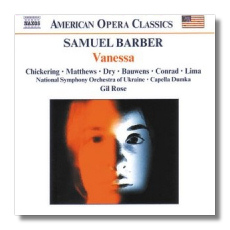
The Internet's Premier Classical Music Source
Related Links
- Barber Reviews
- Latest Reviews
- More Reviews
-
By Composer
-
Collections
DVD & Blu-ray
Books
Concert Reviews
Articles/Interviews
Software
Audio
Search Amazon
Recommended Links
Site News
 CD Review
CD Review
Samuel Barber

Vanessa
- Ellen Chickering (Vanessa)
- Andrea Matthews (Erika)
- Marion Dry (The Old Baroness)
- Ray Bauwens (Anatol)
- Richard Conrad (The Old Doctor)
- Philip Lima (Nicholas)
Ukrainian National Capella "Dumka"
National Symphony Orchestra Of Ukraine/Gil Rose
Naxos 8.669140-41
Barber's Vanessa has endured a curious history: This is only its second recording and its modest currency hasn't approached the relative popularity of other American operas, like Douglas Moore's Ballad of Baby Doe and Menotti's Amahl and the Night Visitors, to name just two. Indeed, but Vanessa is probably the finest of these three, though in fairness to Menotti (the librettist for Vanessa, by the way), one can cite a few others of his-The Consul and The Saint of Bleecker Street, for instance-that rise to Vanessa's high level of inspiration.
For Barber admirers and opera mavens in general, the question surrounding the release of this Naxos recording will be, how does it compare with the Mitropoulos-led RCA version from 1958 that featured Eleanor Steber, Rosalind Elias, Nicolai Gedda and Regina Resnik? In the end, the edge has to go to the RCA as far as the performances go, but this one stands up well against it and, not surprisingly, offers better sound, especially from the orchestra, which comes across quite powerfully at climaxes and other crucial moments
All of the principals in the Naxos compare favorably with those in the RCA, though the edge must generally go to those in that older effort. Ellen Chickering, though she might not have quite the vocal beauty possessed by her counterpart Steber, and Marion Dry capture their roles particularly well here, and I liked Ray Bauwens as Anatol. All have a fine sense for drama and no one, in fact, in the Naxos cast is less than compelling.
Gil Rose leads the NSO of Ukraine with an incisive baton throughout and seems intent on calling greater attention to Barber's orchestration, an approach which at least in part accounts for the greater orchestral presence in the sound reproduction. Actually, he is truer to the score in this respect than Mitropoulos, though the latter can hardly be faulted for showing deference to the singers.
In the end, this Naxos Vanessa must be assessed an impressive effort, even if it does not quite rise to the inspired level of the older recording, one no doubt brought off with the composer's stamp of approval. This, then, especially at Naxos' budget price and because it incorporates changes made in the opera in 1964 by Barber and Menotti, is eminently recommendable.
Copyright © 2004, Robert Cummings


















